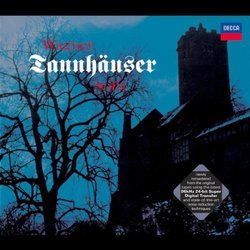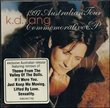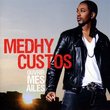| All Artists: Richard [Classical] Wagner, Georg Solti, Vienna Philharmonic Orchestra, René Kollo, Norman Bailey, Victor Braun, Helga Dernesch, Kurt Equiluz, Werner Hollweg, Manfred Jungwirth, Christa Ludwig, Hans Sotin Title: Wagner: Tannhäuser Members Wishing: 0 Total Copies: 0 Label: Decca Release Date: 2/11/2003 Album Type: Box set, Original recording remastered Genre: Classical Style: Opera & Classical Vocal Number of Discs: 3 SwapaCD Credits: 3 UPCs: 028947081029, 028947081029 |
Search - Richard [Classical] Wagner, Georg Solti, Vienna Philharmonic Orchestra :: Wagner: Tannhäuser
 | Richard [Classical] Wagner, Georg Solti, Vienna Philharmonic Orchestra Wagner: Tannhäuser Genre: Classical |
Larger Image |
CD DetailsSimilar CDs |
CD ReviewsMagical Ted Zoldan | Los Angeles, CA, USA | 04/11/2005 (5 out of 5 stars) "I still can't listen to the Pilgrim's music from TANNHAUSER without hearing Elmer Fudd and Bugs Bunny sing along to it in the classic Cartoon "What's Opera, Doc?" It is only seldom that a recording lets me completely forget the Rabbit. This is one of them. The most prominent advantage of this set is the use of the "Paris" edition of the score, as opposed to the "Dresden" version, which does not include the apparition of Venus or the Funeral of Elisabeth at the end, which were added for Paris. (It does include a song for the minstral knight Walther von Vogelweide in the song contest) Secondly, the full score is performend, including the ENTIRE Venusberg ballet: all ten-plus minutes of it. The Cast is wonderful. Tannhauser has not been all that well served on record: Good performances for the most part, but there is no performance akin to Elisabeth Grummer's Elsa or Anja Silja's Senta: definitive performances. Rene Kollo is the closest we come to perfection. He is a controversial singer: his voice is not exactly of miraculous quality, and many despise his traversal of the role. I love it. He's no Domingo, who's Minstrel-Knight is ravishingly sung, but there is an intensity and dramatic depth to the Kollo's performance that Placido does not reach. The Rome Narration, as with many Tannhausers, is his best moment: all the agony and angst of the character come pouring out. It's both frightening and heartbreaking. There is beautiful singing in the duets with Venus and Elisabeth, and his blasphemous Hall Song is wonderful. The Two women in his life are also excellent. Helga Dernesh is heavier than the norm for Elisabeth, and has been bettered on record by Anja Silja, Elisabeth Grummer and, best of all, Lucia Popp. But her vocalism is ravishing: her greeting to the hall and the love duet with Kollo are genuine in their joy, and her appearance in act three is heartbreaking. She's no great shakes dramatically, but has enough talent to pull the role off, and she does it well. Christa Ludwig's Venus is the best on records: a seductive, warm tone combined with the mezzo's infallible dramatic ability. Her appearance in act three is so seductive I was ready to look for the Venusberg myself. Wolfram seems to get the short end of the stick in many of these reviews: the singers of this most important part are hardly mentioned. I intend to rectify that. Much has been said about the "beat" in Victor Braun's voice. I couldn't hear it at all. Sure, he's no Fischer-Dieskau or Watcher, but he has a sweet voice and has great sensitivity twords the meaning of the text. His ode to the Evening Star is wonderful. In the rather thankless role of the Landgraf, Hans Sotin has a resonate, authoritative sound. The Minstrel-Knights are excellent (they include a feature Wotan, Sachs and Dutchman for Solti: Norman Bailey) and the Biterolf of Manfred Jungwirth is strongly sung. The wonderful boy Soprano who sings the Shepard Boy is rudely uncredited. It took me a few hours of searching the internet to find out the singer's name is Johann Konigen. He has a beautiful voice. The Chorus work is wonderful, and the older Pilgrims are ravishingly sung by the Weiner Staatsoperchor. Presiding over it all is Sir Georg Solti, of course. Solti is Solti, rather bombastic, dramatic, not as subtle as other conducters such Karajan, Bohm, and Sawallich. This approch can be succesful enough with Verdi and Mozart, but when it comes to Wagner (and Strauss), he is nearly irreproachable. Here, he is still bombastic and direct, but he is more subtle than usual. He is, in fact, surprising in tune with the emotion of the score. The Majesty, the Mysticism, the love (and lust), the majesty: all the elements are brought to the listener's attention more subtlety than in the conductor's other Wagnerian recordings. The Weiner Philharmonker responds to his leadership to create one of the best played TANNHAUSERS on disk. In fact, it is the best performance of the work available. There are elements of other Tannhauser's you may want to experience: The Elisabeth of Popp and Silja, Fishcer-Dieskau or Eberhard Watcher's Wolfram, or the conducting of Wolgfang Sawallish, or even the Dresden version of the Opera, but if one can only have one TANNHAUSER, this is it." A Reference Tannhauser J. H. Gaulard | London United Kingdom | 01/17/2007 (5 out of 5 stars) "Following several reissues in CD and a new 24-bit super digital transfer (!), this now legendary Tannhauser sounds younger than ever. Of course this has a lot to do with Solti's flamboyant style and his marvellous orchestra, in peak form. The score really sounds like it is in cinemascope and Technicolor and this CD is probably the closest thing to Ben Hur on a CD: the listener has really his money's worth of musical emotions! But the beauty of Solti (versus a late Karajan) lies in the fact that for him an opera remains...an opera, and not a symphony with voice accompaniment. So during all Solti's career on disc, there will be this willingness to find the appropriate singers to "compete" effectively with the magnificent orchestras he conducts (like the Wiener Phiharmoniker here, or the Chicago Symphony Orchestra at times in the Wagner operas). In the 50s and the 60s, picking good Wagnerian singers was still a relatively easy job, but in the seventies, the going started to get tough... However, in my opinion, this set is a great success from a vocal standpoint. Let's the put the record straight immediately: Rene Kollo is a great Tannhauser, but I guess it is the fate of the heldentenors to get the slack of older generations: Windgassen got hammered because he was not Melchior, Kollo was hammered because he was not Windgassen, and Jerusalem got hammered because he wasn't...Kollo! Rene Kollo throws his heart and soul in the part like there is no tomorrow and really impersonates very well the tempted Wartburg singer. The "return from Rome" is declamated in style and we are lucky to have this memory of Kollo in the part at a time (1971) where he hadn't taken on very big Wagner role yet. The voice is therefore extremely fresh and full of brilliance. Among the ladies, the Venus of Christa Ludwig is an absolute reference: warm of voice, extremely good with the text, she nails the part like no one else: let me on the next bus to the Venusberg please! Helga Dernesch is more problematic. She has big enough a voice to sing the part but Elisabeth is more than a Brunnhilde in waiting, and Dernesch does not reflect that , since every note she sings is sung fortissimo. We prefer lighter, more fragile and more human Elisabeths, such as Anja Silja. Victor Braun is a perfect, very moving Wolfram - he was a Hans Sachs in Paris at the end of the 1980s...he would be the tonal equivalent of a baritone Kurt Moll. Last but not least, Hans Sotin sings a very good Landgrave. Hilariously, the remaining comprimarii parts (with sometimes just a couple of bars to sing) are given to first-class singers: Hollweg! Equiluz! Jungworth! Bailey! The chorus is phenomenal as can be expected, but the female entry chorus in Act II is a bit strident. Overall, an amazing performance of Tannhauser's Parisian version. Auditors more inclined to the experience of the theatre will choose Sawallisch in Bayreuth in 1962, very different but very good as well. I would be at odds to make a choice between these two marvellous versions though. " A Tenor's Traviata---Perfection! The Cultural Observer | 06/26/2006 (5 out of 5 stars) "Tannhauser is one of the most challenging tenor roles ever written by Wagner after Tristan and the young Siegfried. It is challenging because like Violetta, the first act of Tannhauser requires a voice of agility and power to go through the music's high tessitura. The second half requires a more dramatic voice that reminds the audience of Tannhauser's agony (not very much unlike Tristan's agonizing third act).
Besides the challenge of assigning the role to a great tenor who can sing it (and some say that only Melchior can do the role right...I disagree...Melchior sounds too porky), the opera also needs a great conductor to create a contrast of musical worlds created by the Venusberg and the Wartburg. You also need an excellent baritone who sings the role of Wolfram with an earnest, heartbreaking singing acting talent that brings the character's contrasting characteristics to Tannhauser's more devilish and fickle role. And of course, there also has to be two great prima donnas who have the singing and the acting talent to bring to life the characters of Elisabeth and Venus. A pure jugenlich dramatisch soprano would be perfect for Elizabeth, whereas a more sensuous voice is needed for the pagan goddess Venus. This recording delivers all of that, and let me start with the conductor. Georg Solti is accused by many for his rough hand with Wagner's scores (or with all scores, for that matter). I find that by the time he recorded Tannhauser though, he had had his experience with Mozart and had developed a style that put his conducting of any Germanic composer's music in its right style (unlike the older Solti recordings where everything is gung-ho!). His Tannhauser creates two worlds of varying orchestral timbre, beginning with Venusberg's most sensuous and erotic music. The overture is done so beautifully, and never before did the Paris Venusberg scene come to life like in this recording. His Wartburg scene provides a most amazing contrast to Venusberg. I think that this is one of his best Wagnerian outputs after the Ring, and I would definitely recommend this as the best conducted Tannhauser. Of course, the Vienna Philharmonic Orchestra's brilliance adds to the recording's many merits. Now to the singers. I believe the best singer in this recording is Christa Ludwig in the role of Venus. No one else showed much vocal beauty in such a sensuous role, and while some dramatic sopranos had sung the role before, no one does it better than our favorite dramatic mezzo. It is sexy and voluptuous at the same time, and Ludwig characterizes the goddess of love masterfully. The other prima donna in this recording, Helga Dernesch, puts forth a radiant, pure-sounding tone that gives the listener an impression of kindness and compassion for a role that requires such characteristics. I would find Gundula Janowitz more ideal for the role, but Helga Dernesch more than efficiently delivers. It is an artistically perfect, well-rounded, tasteful, and beautiful Elisabeth. Braun is adequate as Wolfram, and one would have wished Fischer Dieskau or Hermann Prey in the role, but it isn't a bad interpretation. Of course, this brings us to the title role. Many accuse Rene Kollo of using his inadequate resources in singing this demanding Wagnerian tenor part. I would disagree with other reviewers. I believe that more so than other tenors, Kollo offers a youthful tone and dramatic sensibility (and a certain demonicness) to a role that demands a high tessitura (which he has), a dramatic sense (which Kollo innately has), and an innate sense of eroticism (which he also has). I certainly prefer him to Lauritz Melchior, who sounds too porky for my taste. Sure, he can sing the role right, and while his Siegmund, Siegfried, and Tristan have all the notes, that's all they have. It's not a very dramatically interesting performance, and often times he sounds piggish. I think Kollo makes a better Tannhauser (and sings all the above parts much better too, in an artistic point of view). One would desire Domingo's voice of course, but at the time of recording this opera, his German was still terrible. If he could still sing the role now and rerecord it again, that would be amazing of course. A desirable cast: Tannhauser: Domingo Elisabeth: Nina Stemme Venus: Michelle de Young Landgraf: Rene Pape Wolfram: Olaf Bar or Thomas Hampson Conductor: Christian Thielemann, or preferably, Pappano This recording though, has more than enough merits to make it the best Tannhauser recording in the market. A perfect one has yet to come (as with every other Wagner opera), but for now, this one is the best." |



![Americans in Paris: Jazzmen Love France [Audio CD] Various Artists](https://nationalbookswap.com/cd//m/84/0784/870784.jpg)